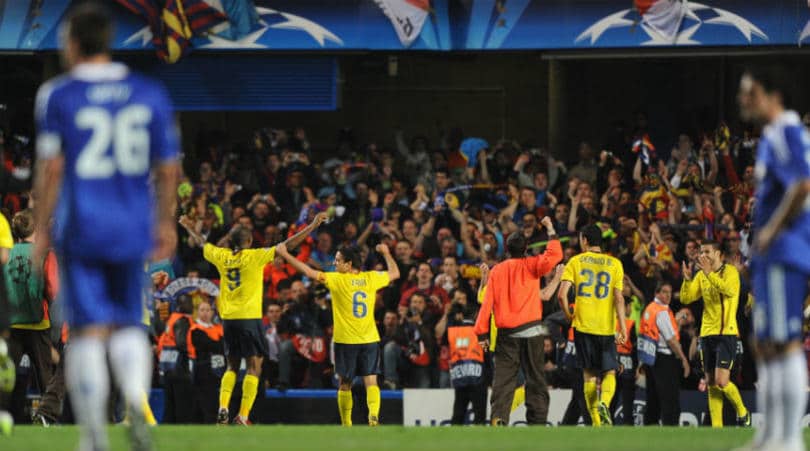Introduced over 50 years ago to encourage away sides to attack, it’s now more likely to have home teams shutting up shop. After years of controversy, Uefa is finally considering getting rid of the rule – but why did it take so long?
Joan Maria Pou doesn’t have a clue what he’s thinking the moment Andres Iniesta’s right-foot rocket careers into Chelsea’s net. Frankly, he couldn’t care less. It’s the last minute of the Champions League semi-final second leg in 2009 and Barcelona are on the precipice of being accepted as one of the greatest club sides in football history.
But they are also on the brink of elimination. After drawing the first leg 0-0 at the Nou Camp against Guus Hiddink’s Blues, they are a Michael Essien goal down, with seconds remaining. The dream is fading. All looks lost. Suddenly, Iniesta strikes. Chaos.
Commentating for RAC1 in Spain, Pou explodes in a fit of raving hysteria. ‘Kaiserslautern!’ he screams amid the studio’s wild cries, in reference to a last-gasp away goal against the Germans en route to Barça’s first European Cup in 1992. Once may be enough, but Pou can’t stop. ‘Kaiserslautern! Kaiserslautern! Kaiserslautern!’ Eight times he screams.
Meanwhile, Chelsea are furious. They’ve had four penalty appeals turned down, but are out on away goals. Michael Ballack yells maniacally in the face of Norwegian referee Tom Henning Ovrebo. An apoplectic Didier Drogba storms on to the pitch and screams into the camera: ‘It’s a fucking disgrace!’
It wasn’t the only pivotal tie settled on away goals. The next year, Louis van Gaal’s Bayern Munich reached the Champions League final, sneaking through the backdoor via away goals in both the last-16 and the quarter-finals. ‘It’s hard to digest something like that,’ Sir Alex Ferguson lamented post-match (while ranting about Bayern surrounding the referee like ‘typical Germans’). Six Champions League ties since have been settled on away goals, including Bayern again in 2013, the Bavarians lifting the trophy only after eliminating Arsenal thanks to the rule.
A growing perception that the away goals rule now tips the balance too heavily in favour of the away side has led to calls for its abandonment. The idea of scrapping the rule completely was consequently debated last September at a two-day Uefa conference of elite coaches in Nyon.
‘The weight of the away goal is too heavy, too big and not justifiable anymore,’ Arsene Wenger has argued, while Ferguson, who chaired the meeting in his capacity as Uefa coaching ambassador, revealed that some coaches ‘think it’s not as important as it used to be… the attacking emphasis on the game today means more teams go away from home and win.’
Whether it comes into play here or not the away goal rule sucks. No goal should be of greater value than another.
— Gary Lineker (@GaryLineker) March 15, 2017
Since the turn of the century, 26 Champions League knockout games have been decided on away goals, and statistics show the average number of second-leg away goals scored in European competition has steadily increased in every decade since the 1980s. Additionally, while the average number of goals per game was about evenly spread between first and second legs during the 1960s – the decade in which the rule was introduced (3.18 in the first leg vs 3.17 in the second) – in every decade since, the average number of goals scored in the second leg has been significantly higher.
The number of teams winning away from home in Europe now, compared to the 1960s, has also more than doubled. ‘Maybe the defenders are earning less money,’ Rafael Benitez put it. ‘Teams aren’t so negative away.’
All of which begs the question: is it time to scrap the away goals rule?
Fairer than 50-50
In a football era that has sprinted so quickly towards modernisation, it seems strange to think that the pinnacle of the European game continues to rely on a rule that is beyond its 50th anniversary. Before 1965, European ties ending all-square were decided by play-offs, often hosted on neutral grounds. If the play-off ended in a tie after extra time, a coin toss would decide the winner – an unsatisfactory and cruel way of settling things after 300 minutes of football.
The catalyst for change came in 1964-65, when Liverpool advanced to the European Cup semi-finals after beating Cologne in a coin toss. ‘The ref produced a plastic counter twice the thickness of half a crown, red on one side, white on the other,’ wrote Horace Yates in the Liverpool Echo. Liverpool captain Ron Yeats won the toss and the Reds were through, the sense of farce compounded when the coin landed sideways in the soft turf at Feyenoord’s De Kuip and had to be tossed a second time. ‘What a most unsatisfactory way to separate two gallant and closely matched sides,’ mused Yates.
The away goals rule was introduced the following season. Honved were the first beneficiaries, advancing in the Cup Winners’ Cup at the expense of Dukla Prague after a 4-4 draw on aggregate.
Its implementation made sense. European travel was long and costly, and playing away from home created a significant disadvantage. Manchester United, the first English team to win the European Cup, didn’t win a single away game in that successful 1967-68 campaign, an example of the difficulties posed by European away games. The conditions teams would face when playing away in Europe were demonstrated when Everton became the first English side to lose on away goals, in the 1970-71 European Cup, after their quarter-final with Panathinaikos ended 1-1 on aggregate.
After drawing 1-1 at Goodison Park, the Toffees travelled to Athens knowing they needed at least one goal to have any chance of making the semi-finals. What awaited them, however, was like nothing they’d experienced – ‘a nightmare atmosphere which revealed all the worst features of European football,’ reported the Echo’s Michael Charters.
‘In the latter stages of the game [at Goodison] they were poking and prodding at us, pulling our hair and saying ‘Athens, we will see you in Athens,’ Joe Royle later remarked. ‘When we went over there, their fans were outside the hotel, driving around on motorcycles to keep us awake.’
‘We were subjected to a torrent of Greek phlegm,’ substitute Roger Kenyon recalled in Gwladys Street’s Holy Trinity. ‘From my experience Panathinaikos supporters were all heavy smokers who suffered from catarrh.’ ‘Athens,’ as Everton’s promotions manager David Exall put it, ‘was an absolute nightmare.’
Dodgy pitches, hostile crowds, wearying hours of travel and trepidation aroused by journeying into the unknown were just some of the factors that made playing away in Europe so daunting.
‘Bricks came through the front window and one of the side windows,’ Maurice Malpas recalled of Dundee United’s 1984 European Cup semi-final second leg defeat away to Roma. ‘It was a proper fight. The police were nowhere to be seen.’
Wrong way around
The rule sought to bring greater equilibrium between home and away legs. ‘It was an artificial regulation brought in to avoid a third match,’ former Uefa technical director Andy Roxburgh says. ‘It was to encourage elite teams to attack.’
By and large the rule was welcomed, though of course it was not without misunderstandings or criticism. In 1969 Liverpool were knocked out of the Fairs Cup by Vitoria Setubal after forgetting all about the rule: having won the second leg 3-2 they waited around for extra time, only to be informed by the referee that away goals applied in normal time. ‘We were beaten by a penalty, an own goal and the rules of the competition,’ manager Bill Shankly grumbled.
Over time, however, the rule has grown to look anachronistic. Better pitches, easier and more luxurious travel and developments in both tactical trends and team preparation mean the away goals rule now risks swinging the pendulum too far in favour of the away team, to the point where its original intention has become skewed: one could feasibly argue that the team finishing top of their Champions League group is now at a disadvantage, as they must play the second leg at home.
‘What actually happens,’ argues Roxburgh, ‘is that it works the other way around. It’s encouraged home teams to defend. It gives certain goals an added value and you can argue that’s artificial. It encourages caution that wouldn’t be there if you removed it.’
‘Counter-attacking is part of modern football and something that has really developed in the European game in the last six or seven years,’ Ferguson said back in 2009. ‘We had a spell after we won the European Cup in 1999 when we were disappointing and had to change our thinking. We lost away to PSV Eindhoven, Anderlecht and others, all on the counter-attack.’
Luciano Spalletti’s Roma, whose 4-6-0 formation’s crowning moment came when they battered Inter 6-2 in the 2007 Coppa Italia Final, in part inspired Ferguson’s change of thinking. Ferguson had first-hand experience of Roma’s system after the sides met in the 2006-07 Champions League quarter-finals.
He began to place greater emphasis on a fast-paced counter-attacking style led by a fluid front three of Cristiano Ronaldo, Carlos Tevez and Wayne Rooney. It worked: United won the Champions League the following season and reached three finals in four years.
The rise of the counter has grown, the away goal’s added value a juicy carrot only further incentivising teams to play on the break away from home. Real Madrid crushing Bayern Munich 4-0 in the Allianz Arena in 2013-14’s Champions League semi-final was a masterpiece in counter-attacking excellence. ‘The development of teams being able to play on the counter-attack is quite incredible,’ says Roxburgh.
‘The classic counter-attack was a boot up the park, but teams have become very sophisticated at what we [at Uefa] call collective counters. They win it somewhere in the midfield and a group of three or four players exploit the opposition at pace.’
‘I think it makes you more attack-minded’
The luxuries of modern life have also weakened the argument for an away goals rule. ‘Nowadays, teams always travel in style,’ says Benni McCarthy, who won the Champions League with Porto in 2004. ‘Trains are first class and the buses and planes are very comfortable. The effect of jet lag has also decreased for away teams.’
Sol Campbell disagrees, however, telling FFT that away travel ‘takes more out of you than you think’.
What can’t be denied is the part played by modern pitches – pristine in condition and a world away from the bogs and mudbaths of yester-year. ‘You’ll never see a good football match on a bad pitch,’ Wenger once moaned, and it says a lot about the modern game’s elevated standard that Pep Guardiola’s Barcelona were once so unimpressed by the state of the San Siro pitch that they filed a complaint to Uefa that Milan ‘failed to water the pitch within an hour of kick-off’.
Technological advancements are also a factor. Everything is recorded and analysed; European away days are no longer a terrifying crusade into the unknown. ‘Knowledge of team tactics is better now,’ says Campbell, who scored in the 2006 Champions League Final for Arsenal.
‘There’s not the mystery of who you’re going to face, because football coverage is so widespread and you’ll go into every game knowing everything you need to about every opponent you might come up against.’
European competition is also seeded up to its eyeballs now: coefficients and ranking systems have created a closed shop that make it rare to see lesser-known sides squeezing into the group stages.
In a sense, Europe has become too familiar for the away goals rule. Elsewhere, in South American or African competitions for example, it still makes sense: wildly differing climates, terrains and longer travelling times dictate that. When San Lorenzo travelled to La Paz to play Bolivar in 2013-14’s Copa Libertadores semi-final it was widely reported the team were given Viagra to help oxygenate the blood and assist them in coping with the 3,650m altitude. ‘Even playing in Quito at lower altitude, you still feel it,’ San Lorenzo manager Edgardo Bauza, who won the Libertadores in charge of Ecuador’s LDU Quito in 2008, told Ole.
Back in Europe, though, Roxburgh senses from his 18 years spent in the company of elite coaches a cooling enthusiasm for the away goals rule. ‘There’s more negativity towards it,’ he says. ‘I gather now most of them are vocal about it. A combination of things has led to a change of perspective on the rules.’
To get rid of the rule, a new solution is required. But at present no credible alternative has been put forward, and Uefa have previously suggested there is ‘no concrete plan or proposal for the rule to be scrapped’.
Meanwhile, some – such as Campbell – remain in favour. ‘I think it makes you more attack-minded. You go to top teams in Europe and know that if you can get a goal it will make a huge difference. It gives the away team that extra incentive to score and I think that’s great. It keeps everyone excited.’
Opinion is clearly divided, then, but until a Plan B surfaces – or an elite team goes out kicking and screaming – the away goals rule will survive.
‘We wanted away teams to attack,’ Roxburgh concludes. ‘Now it’s encouraging home teams to defend. It was introduced for the right reasons but it’s time to look at it.’
Drogba would no doubt agree.












